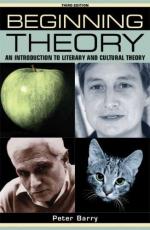|
This section contains 309 words (approx. 1 page at 400 words per page) |

|
Postcolonial criticism Summary and Analysis
Post-colonial criticism emerges in the 1990s by undermining the timeless and universal significance of literature made by liberal humanist critics. Specifically, if great literature is claimed timeless and universal, then cultural, social, regional and national differences are made less significant. Post-colonial criticism rejects universalism. Frantz Fanon is a Martinique psychiatrist in 1961. He claims post-colonial perspective begins by reclaiming the past and diminishing the ideology that devalues it. For example, Yeats is Eurocentric in his "Byzantium" poems by identifying Istanbul, previously called Constantinople with "torpor, sensuality, and exotic mysticism." A first characteristic of post-colonial criticism recognizes non-European as "exotic or immoral Other." The second characteristic uses language that is permanently tainted to require compliance with the colonial effect. The colonizer participates in the double identity of the colonized as well, which leads to the "cross-cultural" interaction of post-colonial criticism's fourth...
(read more from the Postcolonial criticism Summary)
|
This section contains 309 words (approx. 1 page at 400 words per page) |

|




